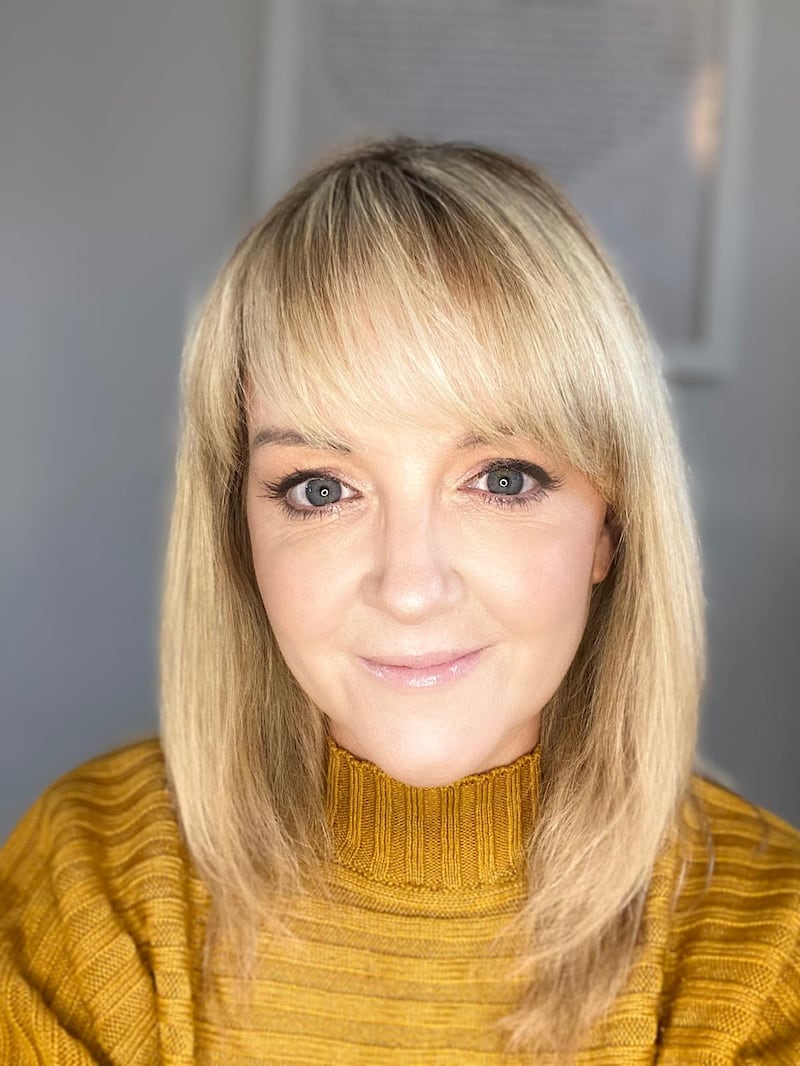In a far-flung corner of a Derry industrial estate, the Thursday morning calm is interrupted by the sound of thunderous drumming.
A group of women are banging huge, cowskin-covered Japanese taiko drums in a mirror-walled dance studio, tucked between a kitchen showroom and a tyre shop. As they play in unison – wearing yellow foam earplugs to protect their hearing – they utter chants, or “kiai”, to encourage each other and release energy.
Beyond this room, their responsibilities are heavy. Each one of these women is a carer: for family members with special needs, foster children, children in kinship care, or elderly parents. During breaks between songs, someone will have to slip outside to answer a phone call that can’t wait, leave early for an appointment or share a message from a friend who is unable to attend. But from the moment they lower their arms ceremonially, and their sticks make contact with the drum, their sole focus is the beat.
Taiko drumming has been part of Japanese culture for centuries, with its powerful rhythms and rousing shouts heard everywhere from religious ceremonies to battlefields.
Derry woman Fiona Umetsu, who runs the Taiko for Carers group and the local Japanese arts organisation Foyle Obon, first encountered the ancient art form in the 1990s. She was teaching English in Tokyo when a friend took her to see the world-renowned taiko group Kodō at a festival.
“In my mind’s eye I can still see [that performance]. You just felt it, all through your body,” recalls Umetsu, who decided there and then to learn taiko for herself, and joined an all-female group in Tokyo.
She also fell in love with a Japanese man, Katsu, at about the same time, after meeting him at a house party on St Patrick’s Day. The couple married, started a family and moved to Ireland in 2000, when Umetsu assumed she would have to bid farewell to the beautiful (and big) barrel-shaped drums for good. “I broke my heart thinking, ‘That’s it now, my taiko world is over’,” she says.
But on a trip back to Japan to visit Katsu’s parents in 2009, Umetsu had the opportunity to buy a taiko drum at a bargain price. After a quick phone call to Virgin Atlantic, the family found themselves flying home with “a drum instead of a suitcase, three children under the age of five and two prams”. Derry was soon introduced to the rich sound of taiko.
More drums were acquired by the couple on subsequent visits, and Katsu was even able to make some himself using a neighbour’s old floorboards.
“It’s been such a labour of love,” says Umetsu, who established Foyle Obon with Katsu and other friends more than a decade ago. In addition to the Taiko for Carers project, the charity has run cross-community workshops for Catholic and Protestant schoolchildren, LGBTQ+ teens and people looking to improve their mental wellbeing.
A number of scientific studies have highlighted the health benefits of taiko, which requires deep concentration as well as physical exertion. In an Ulster University research project into Taiko for Mental Health and Wellbeing, published in 2024, respondents reported “a wide range of mental and emotional health benefits”, as well as help with emotional regulation, anger management, stress and anxiety.
The Taiko for Carers project, which began with a grant from the Department of Health in Northern Ireland’s Support for Carers fund, has introduced more than 150 northwest carers to the art form. There are more than 20 members in the current group.
For many participants, it’s their first time discovering taiko. “We had one girl who thought she was coming to do martial arts,” Umetsu says with a laugh. “We have others who say, ‘I haven’t got a notion what we’re here to do, but someone’s roped me into it’, or you get people who are quite shy. But once we get started, there’s a real development in people’s focus.”
Donna Large joined the project a year and a half ago, shortly after leaving a career in retail management to become a foster carer.

“I had a tough placement the first few months, and the only thing I could get out to was to this group,” she says.
“I had been very sociable before that, and to go to suddenly feeling trapped in your own house, this – it probably sounds a bit silly, but it was my only escape. The one night in the week I could sleep was after coming to taiko. You could just come in and switch off and have a laugh. It was the only time my brain stopped, and I think it’s one of the few reasons I managed to get through the first placement.”
Being a carer is a 24/7 job and at times it can be quite lonely and isolating, whereas this is somewhere that you can chat to other people who get where you’re coming from
— Kelly Brown
For Large, who insists she is “not musical at all”, the fun and connection have been the best part of the experience.
At the start of every session, each person will share how their week has gone, and what wins or challenges they’ve had. With funding from housing association Radius Housing’s Good Relations programme, the group has also watched presentations about life in Japan, and learned origami and traditional festival dances.
After the drumming, over a cup of tea or some lunch, the carers offer each other support and advice, and laugh at any blunders they made during practise.
There is also a WhatsApp group, which was “popping” in May when the carers performed at the annual Foyle Obon Festival. A Derry park was transformed into a “Little Tokyo” for the celebration of Japanese culture, with drumming, traditional dance and storytelling, and sushi-making and calligraphy demonstrations.
The Taiko for Carers group played in front of about 350 people in a large amphitheatre, joined on stage by two members from Kodō – the famed act who Umetsu first saw in Tokyo 30 years ago.
It was Large’s second time performing at the festival. “I have no co-ordination whatsoever and last year, when my friends came to see me, they ripped me to shreds that day. They loved watching me fumbling about,” says Large. “But it was the best thing, because when you’re fostering, your family and friends might meet the kids, but they don’t meet the other carers. They got a huge insight that day into how big the network is.”
Two children who Large was providing respite foster care for also came to watch this year, and had “an absolute ball”.
Kelly Brown, a supervising social worker for foster carers, and a carer herself, has been with the project since its inception.
“When carers are mentally fit and mentally healthy, they can do a really good job of caring for our children. A big part of my focus is on wellbeing,” she says.
“The idea was to find something to unify the carers, to give them somewhere to come together and share common ground. Being a carer is a 24/7 job and at times it can be quite lonely and isolating, whereas this is somewhere that you can chat to other people who get where you’re coming from. You can share your stories, and hints and tips about how to manage difficult situations.”
[ Who cares for the carers? ‘If I was going to be able to help Tony I needed to get my own life back on track’Opens in new window ]
Brown adds: “A lot of our carers don’t get the opportunity to travel; they never get a night away. A lot of the people we work with, through illness or because they are young children from an adverse background, they’ve never had a chance to go anywhere outside of the city walls, basically.
“Having the experience of going to Little Tokyo was outstanding for them and opened their awareness of different cultures and different ethnicities.”
Áine McFadden is a kinship carer to her grandson and granddaughter, aged 11 and 10.
“We do everything around the kids, and this was for us. I loved it,” she says. “I blocked out my time, and I was so precious about it that I wouldn’t allow anyone to interrupt it. If I had to miss it once, I felt that I didn’t get my energy out that day.”
Before the festival performance, McFadden was “terrified” with nerves.
“I couldn’t look at my grandchildren,” she admits. “And then while I was doing it, I just forgot about the audience. I put myself back into playing here and how it makes me feel and why I’m doing it.
“Afterwards, seeing the two kids clapping and really excited just gave me a real sense of achievement. I did this amazing thing in front of people that I would never have done in my wildest dreams. You just get into the excitement and passion, and you feel all right because Fiona’s there.”
Back in the dance studio, the carers have put down their drumsticks for the morning. This is their last meet-up for now; the project will go on pause while Umetsu seeks funding for more sessions.
There are cups of tea and boxes of buns waiting for them in the room next door, and she, Katsu and their son Forton will soon start packing up the drums.
But first, the group must finish together in the traditional Japanese way, by uttering the words, “otsukaresama deshita”.

How Japan fell in love with Irish culture
“At the end of everything you do in Japan, whether it’s the end of a workday or playing a game of sports together, whatever you do as a team, you say it to each other,” says Umetsu.
“It means, ‘thank you for making yourself so honourably tired’. You can’t play taiko by yourself. It’s an acknowledgment that we all put our energy in, and we did this thing together.”
foyleobon.com